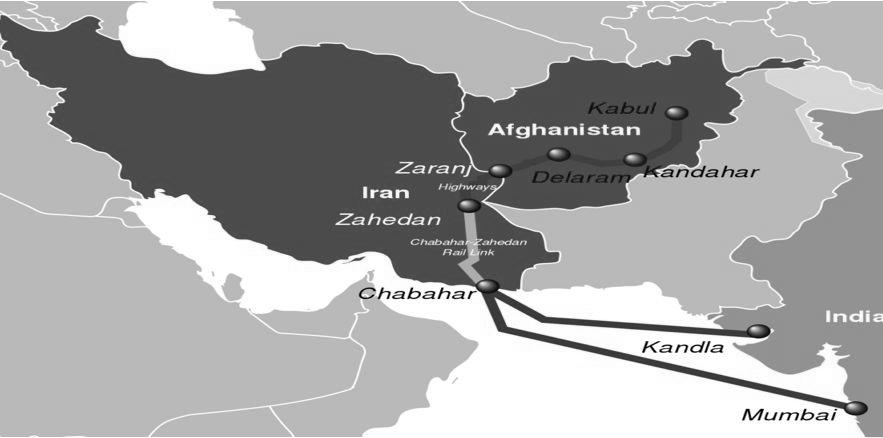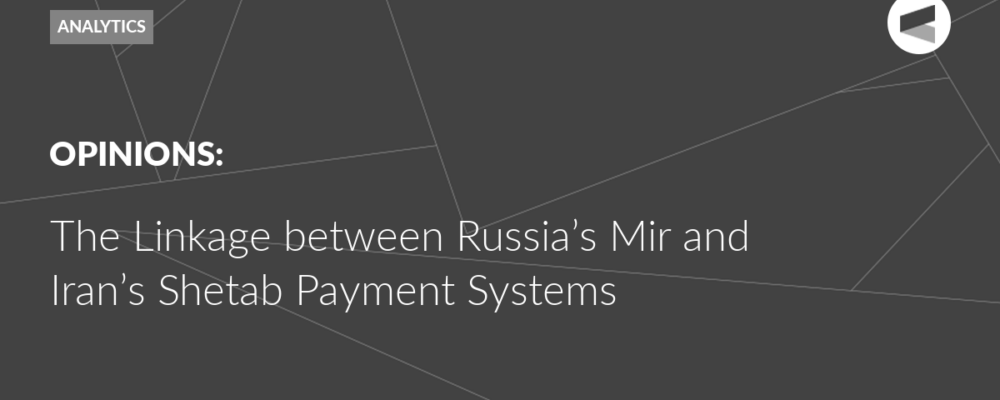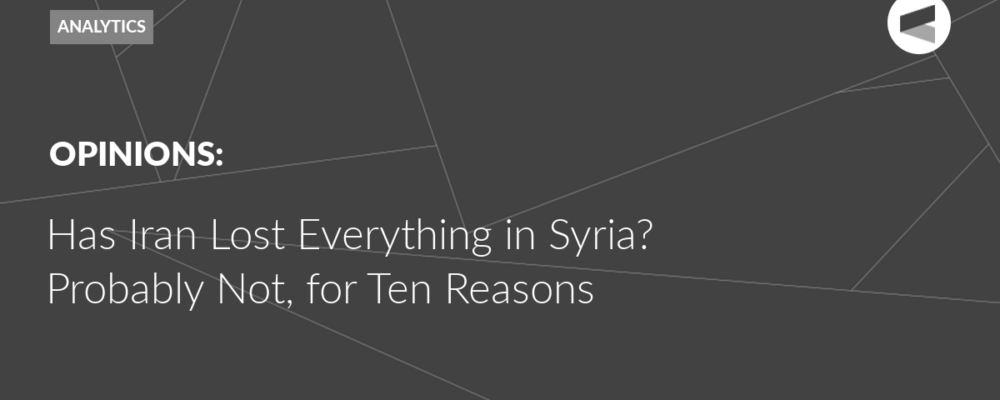The Taliban hopes to send a signal to Pakistan by increasing its participation in the Chabahar port transit project that it which is not a militia group affiliated with this country, rules an independent country and has various options in foreign policy as well as trade and transit.
The Chabahar Transit Project was created on May 24, 2016 as a combined, multimodal network of ships, rails, and road freight routes connecting India, Iran, and Afghanistan. Uzbekistan, the only double-landlocked country in Central Asia, joined it in 2019. After the Second Karabakh War and the start of the Ukraine conflict, Russia, China and Armenia expressed an interest in participating in this transit project as well. Thanks to the influence of the powerful Indian lobby, the first Trump administration issued a waiver in 2018 that exempted Chabahar from US sanctions.
The Routes of the Chabahar Transit Project (Source: Eurasia Daily Monitor)
However, following the Taliban’s return to power in late August 2021, the Chabahar transit project faced a very serious challenge. Transit and trade had stopped for about three months between Iran and Afghanistan due to the closure of borders between the two countries. Furthermore, the Taliban’s close traditional ties with Pakistan and the Taliban’s position on India and Kashmir (consistent with Pakistan’s), increased challenges and uncertainties. In this regard, shortly after the fall of Kabul, Indian officials stated that “Afghanistan under Taliban rule will not be included in the India-Iran-Uzbekistan agreement to use the Chabahar port in south-eastern Iran”. Under these circumstances, the Taliban’s desire to include Afghanistan in the China-Pakistan Economic Corridor (CPEC) became a new challenge for the Chabahar transit project. Taliban spokesman Zabiullah Mujahid on September 2021 expressed that “the group desires to join the CPEC”. On the other hand, Pakistan’s former Interior Minister Sheikh Rashid Ahmed welcomed the Taliban’s desire for Afghanistan’s inclusion in CPEC and said, “it is a positive sign if the Taliban share Pakistan’s perspective on China. Our cautery is proud of its friendship with China, and if the Taliban share these sentiments, then that is excellent”.
But under the influence of the unstable political, social and security conditions of Afghanistan and Pakistan, the conditions gradually changed. The countries of the region, including Iran, Uzbekistan and India, without officially recognising the Islamic Emirate of Afghanistan, formed de facto relations with it. On the other hand, the Islamic Emirate aimed to increase its internal and external legitimacy, especially amid non-recognition by the international community, through regional economic and transit projects such as the Chabahar transit project, the China-Pakistan Economic Corridor (CPEC), the TAPI gas transmission line, and the Central Asia-South Asia (CASA-1000) Electricity Transmission Project. In this regard, the Islamic Emirate tried to revive the Lapis Lazuli Corridor, which would connect Afghan trade to Europe.
In the meantime, the escalation of differences between the Islamic Emirate of Afghanistan and its old ally, Pakistan, over the past year has caused the Taliban to pay attention to the Chabahar Port transit project. Border tensions increased, especially after a terrorist attack against a military post in Dera Ismail Khan city in northwestern Pakistan, located at the edge of the lawless tribal regions bordering Afghanistan in December 2023. Pakistan accused the Islamic Emirate of supporting Tehreek-e-Taliban Pakistan (TTP), a Sunni Islamist nationalist and pro-Pashtun movement, and more importantly, expelled more than one million Afghans, worsening relations between the two old, traditional allies. Amid these circumstances, Taliban officials have spoken
publicly about disconnecting from “a country [i.e. Pakistan] that has been heavily involved in Afghanistan’s affairs.”
It was clear that given the border tensions between Afghanistan and Pakistan, the successive blockages of the border and customs crossings, and the long line of trucks on both sides of the border (which has created difficult conditions at the border points of the two countries amid the wave of deportation of Afghan immigrants), the Islamic Emirate had to utilize more of Iran’s transit and commercial capacity, especially the Chabahar Port transit project. In this regard, the Islamic Emirate announced on September 17, 2023 that “they have increased their efforts to develop the activity of Iran’s Chabahar Port with the aim of not harming the merchants of the country and not relying on a single transit route.” Indeed, a spokesman for the Islamic Emirate mentioned that “we are trying to prevent losses to our traders. Our traders should not rely on one country, one path, and one way. Chabahar is active now.” It is clear that what this Taliban official is referring to is Pakistan.
During the March 2024 meeting in Kabul between Amir Khan Muttaqi, the Taliban’s foreign minister, and J.P. Singh, the head of the Afghanistan and Pakistan Division of India’s Foreign Ministry, Chabahar was a topic of discussion. A statement from the Taliban Foreign Ministry on March 28 specifically mentioned
India’s “support for bolstering trade between the two nations via the Chabahar port.”
Although, the relations between the Islamic Emirate and Iran were not very warm due to differences between the two countries regarding the exploitation of water resources of the Hirmand River, Afghan immigrants in Iran, and some border clashes. However, in a pragmatic approach, a delegation led by the deputy Prime Minister for Economic Affairs, Mullah Abdul Ghani Baradar, visited Tehran on November 6, 2023 and met with the Interior Minister and the First Vice-President of Iran. The delegation also visited Chabahar Port and Baradar requested that “Iran facilitate easier access to Chabahar Port, enabling Afghanistan to reach global markets more effectively”.
Furthermore, in late February 2023, Shargh daily newspaper in Iran reported that despite these tensions, the Taliban wants to invest $35 million in commercial, residential, and government projects at Chabahar Port and the Chabahar Free Economic Zone. According to the report, the Taliban’s investment will be used in the Fakher construction project, a 25-story high-rise. It seems that this is the first official foreign investment of the Islamic Emirate after the return of the Taliban to power in August 2021. Following this approach, an Afghan delegation led by Muhammadullah Bakhtiar, the ministry official in charge of international transit, visited Chabahar on March 4, 2024 where he had a meeting with then-Secretary of Iranian Free Zones High Council Hojatollah Abdolmaleki. At this meeting, the Afghan delegation called for the opening of an economic representative office in Iran’s southeastern port of Chabahar.
Iran hopes that by increasing Afghanistan’s dependence on the Chabahar commercial and transit route, it will encourage the Islamic Emirate of Afghanistan to be more flexible and cooperate in the use of Hirmand’s water resources, border security, and dealing with millions of Afghan immigrants in Iran. Iran also hopes that the greater participation of the Islamic Emirate will further strengthen the Chabahar Port transit project as the “eastern wing” of the North-South Corridor. In particular, the Ukraine conflict and the blocking of Russia’s transit and commercial routes to Europe have led Moscow to use the North-South corridor more and more, especially in trade with Iran and India. Indeed, Yemen’s Houthi attacks on commercial ships in the Red Sea have also caused more attention to be paid to the north-south corridor as an alternative route. These circumstances can also make India more dynamic in INSTC as well as the Chabahar transit project, and Tehran hopes that with the increase in the differences between the Islamic Emirate and Pakistan, justification for more cooperation between the Taliban and Iran and India will be provided. The visit of India’s External Affairs Minister Subrahmanyam Jaishankar to Iran on January 15, 2024, and also the meeting of an Indian delegation with Taliban Foreign Minister Amir Khan Mottaqi in New Delhi on March 8, 2024, can be interpreted as signs of this process.
The Taliban also hopes to send a signal to Pakistan by increasing its participation in the Chabahar port transit project that it is no longer simply an Afghan militia group, but governs an independent country and has various options in foreign policy as well as trade and transit. The development of the Islamic Emirate’s relations with Iran and India is not an issue that Pakistan can easily ignore, and may lead its new government to exercise flexibility towards the Islamic Emirate so that the Taliban will not get closer to Iran and India as a result of differences.
On the other hand, on February 4, 2025, US President Donald Trump signed a National Security Presidential Memorandum, effectively reinstating the “maximum pressure” policy of his previous term on Iran. This executive order revives comprehensive sanctions following Trump’s unilateral withdrawal from the Joint Comprehensive Plan of Action (JCPOA) also known as the Iran nuclear talks in 2018 and tasks multiple US agencies, including the Department of the Treasury, State Department, Department of Commerce, Department of Justice, and the US Permanent Representative to the UN, with enforcing the policy. A key aim is to reduce Iran’s oil exports to zero, particularly to China, and to end certain exemptions, such as those for the Chabahar Port, which links Iran to the Oman Sea.
While the prospects for indirect negotiations between Iran and the United States remain unclear, we cannot expect the rescission of Donald Trump’s executive order exempting the Chabahar transit port from maximum pressure and unilateral US sanctions in the near future. This ambiguity could affect the participation of India and even Uzbekistan in the Chabahar Port transit project, so that they do not face political pressure and economic sanctions from the United States. Nevertheless, it is likely that the participation of Iran and the Taliban in this transit project will continue. Iran, which remains under economic sanctions, and the Islamic Emirate, which lacks international legitimacy, have many incentives to develop trade and transit via the Chabahar Port Transit Project as the eastern wing of the INSTC.
The Valdai Discussion Club was established in 2004. It is named after Lake Valdai, which is located close to Veliky Novgorod, where the Club’s first meeting took place.
Please visit the firm link to site






